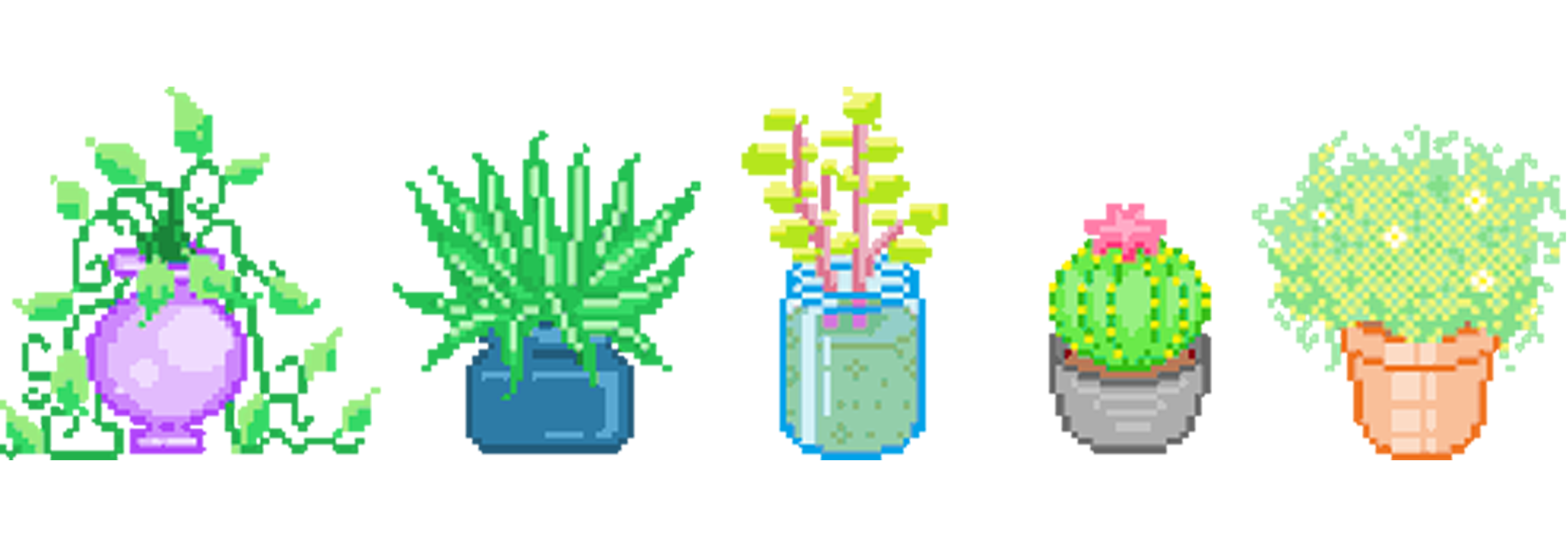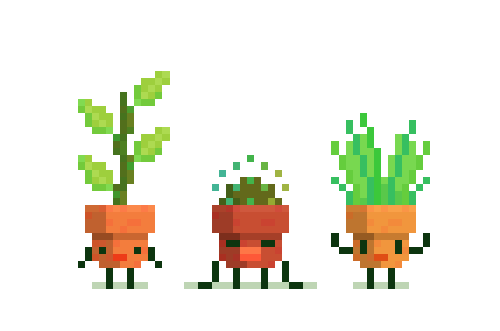Get a cutting from a friend's pothos. Dig up a tiny local sapling and learn about bonsai. Make a moss terrarium. Go get more if they all die catastrophically. Think locally if you're worried about the ecological/ethical footprint. And don't buy miracle gro.
Houseplants
Welcome to /c/houseplants @ Mander.xyz!
In between life, we garden.

About
We're a warm and informative space for plant enthusiasts to connect, learn, and flourish together. Dive into discussions on care, propagation, and styling, while embracing eco-friendly practices. Join us in nurturing growth and finding serenity through the extraordinary world of houseplants.
Need an ID on your green friends? Check out: !plantid@mander.xyz
Get involved in Citizen Science: Add your photo here to help build a database of plants across the entire planet. This database is used by non-profits, academia, and the sciences to promote biodiversity, learning and rewilding.
Rules
- Don't throw mud. Be kind and remember the human.
- Keep it rooted (on topic).
- No spam.

Resources
Recommendations
Health
Identification
- PlantNet.org (see also: !plantid@mander.xyz)
- Seek from iNaturalist
Light Information
- GrowLightMeter
- PlantLightDB
- HouseplantJournal (Scroll down.)
Databases
- Catalogue of Life
- Perenual.com
- The Garden.org Plants Database
- Useful Tropical Plants (Interactive Database Version)
- WorldFloraOnline
- USA-NPN
- Tom Clothier's Garden Walk and Talk
- Plants for a Future
- USDA Datasets
- Permapeople.org
- Temperature Climate Permaculture: Plant Index
- Natural Capital Plant Database
- Colorado Plant Database
- SEINet
- North American Ethnobotany Database
- BCSS Field No. Lookup (collection site IDs for cacti and succulents)
- U Michigan Native Plant Database for Michigan by Region
FOSS Tools
- Common House Plants API
- HappyPlants (Monitoring App)
- PlantGeek (Care Info App)
Similar Communities
DM us to add yours! :)
General
Gardening
- !balconygardening@slrpnk.net
- !gardening@mander.xyz
- !nativeplantgardening@mander.xyz
- !gardening@lemmy.ml
- !gardening@midwest.social
- !permaculture@lemmy.world
- !tropical_plants@mander.xyz
Species
Regional
Science
Sister Communities
Science and Research
Biology and Life Sciences
- !anthropology@mander.xyz
- !biodiversity@mander.xyz
- !palaeoecology@mander.xyz
- !palaeontology@mander.xyz
Plants & Gardening
Physical Sciences
Humanities and Social Sciences
Memes

Snakeplant. You basically can't kill them I stg. They are sold everywhere. They come in fancy flavours. They can adapt to most lighting conditions. They're ok with you messing up watering them.
Those are a lot of good questions but I'm driving so I'm going to toss out a quick recommendation- i like plants that are great at cleaning my house air.
Let me recommend the ZZ Plant, the 'eternity' plant
https://www.thespruce.com/zz-zanzibar-gem-plant-profile-4796783
There are houseplants that are taken from nature endangering the species or grown in tropical countries and imported. But this isn't that common, especially for plants that are meant for beginners. Most countries will also have very strict laws and policies that prevent importing invasive, endangered species, or any plant that may become a threat.
Most houseplants are grown much closer to the place they will be sold (if you live in Europe, the ones you find in stores probably come from the Netherlands. Many will have their Plant Passport that can tell you where they exactly come from!), which not only reduces the impact but it also helps the plants to be better acclimated to those places.
I am not really sure if you can grow native plants indoors unless you live in a tropical country. Plants in colder climates usually need to experience the cold of the winter! Which is hard to provide in a home. Also, some plants are protected and can't be taken from nature.
My favorite houseplants are pothos, philodendrons and other aroids.
But I would suggest you look into Tradescantias instead. They are very hardy and easy to grow. And they come in many different colors!
You just must be aware that they are considered an invasive species in some places. However, as long as they are kept in pots inside the house (or a balcony, for example), there shouldn't be any problem.
Since they are so easy to grow, many people sell or give away cuttings (check for example this thread on Mastodon). You wouldn't need to attend a commercial store if you don't want to support the environmental impact all the greenhouses and nurseries have.
I don't think cuttings are usually a good idea for beginners cause they grow so slow!! But you don't have that problem with Tradescantias.
Pothos or snake plant. Pothos are easy to make thrive and grow which is rewarding. Snake plant thrives if you rarely water it but it grows slowly.
Both can be found for easonable prices and people are always happy to give others a pothos cutting.
I recommend pothos as well. Snake plant or some other can be as easy but I just like how leafy a pothos can be.
My gardening is I just shove any interesting seeds I get into some soils and see what's up. So far I've grown so many apples (but not many get past sapling stage..), pomegranates, passionfruit, peppers (accidentally killed over winter because I planted end of autumn. Thought that would happen but still), tomatoes, avocados. Mostly germinated on my windowsill in the UK, other than avocados which are weird.
Other options are cacti. Just cut a piece off and plant it and it'll probably grow, that's been my experience. Some inside and some in a greenhouse. Some are very picky but most are easy to grow and care for. Plus they often have beautiful but short-lived flowers, which makes then even more special when they're in bloom (sometimes the flower literally lasts one night and you feel so lucky to see it)